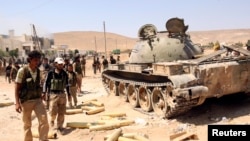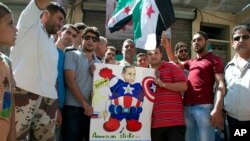Syria's opposition fighters are varied, divided among several factions with differing agendas - but all have the goal of ousting the government of Bashar al-Assad.
The Free Syrian Army, a self-declared non-sectarian group, is the largest and most established opposition faction. Numbering about 50,000 people, it is a hybrid of former military and civilian fighters.
Other factions include the Syrian Liberation Front and the Syrian Islamic Front. They have fewer fighters than the Free Syrian Army and adhere to an Islamist ideology.
Jabhat al-Nusra is a jihadist group that has pledged allegiance to al-Qaida leader Ayman al-Zawahiri and to al-Qaida in Iraq. The group has been growing, with thousands of men from the Free Syrian Army reportedly defecting to its side.
Al-Nusra includes some of the rebels' most tested and effective fighters. The United States has designated al-Nusra a terrorist group.
Western intelligence reports say Islamic extremists in Syria remain by far the fiercest and best organized rebel elements.
Kerry praises moderates
But at congressional hearings this week, while making a case for Obama's plan for limited military action in Syria, U.S. Secretary of State John Kerry said moderate Syrian opposition groups are growing in influence.
Kerry said extremist groups comprise 15 percent to 25 percent of the rebels fighting the Assad regime, adding he does not agree most of the rebels are al-Qaida and the "bad guys."
Kerry also referred to research conducted by Elizabeth O'Bagy, a senior analyst at the U.S.-based Institute for the Study of War.
In her article that appeared last week in the Wall Street Journal, O'Bagy discounted the theory that extremist groups such as Jabhat al-Nusra are leading the fight against Syria's government. She said moderate opposition forces, a collection of groups known as the Free Syrian Army, comprise most of the rebel fighters.
O’Bagy, who says she has spent a lot of time in Syria with opposition groups, shared her findings with VOA.
“There really is a large, moderate opposition force inside of Syria," she said. "This includes not only the civilian administration councils in the activist portion, but actually moderate armed groups are the majority of fighting forces on the front lines and that are actively engaged in the struggle for a democratic and pluralistic Syria.”
For months, the Obama administration has considered arming the Free Syrian Army but has not made that move.
Analysts believe the delay is tied to concerns the weapons may fall into the hands of terrorist groups. It is also believed the U.S. wants to avoid being pulled into Syria's civil war.
U.S. Republican Senator John McCain, ranking member of the Senate Armed Services Committee, has criticized the Obama administration’s reluctance to arm Syrian rebels and establish a no-fly zone over Syria.
The Free Syrian Army, a self-declared non-sectarian group, is the largest and most established opposition faction. Numbering about 50,000 people, it is a hybrid of former military and civilian fighters.
Other factions include the Syrian Liberation Front and the Syrian Islamic Front. They have fewer fighters than the Free Syrian Army and adhere to an Islamist ideology.
Jabhat al-Nusra is a jihadist group that has pledged allegiance to al-Qaida leader Ayman al-Zawahiri and to al-Qaida in Iraq. The group has been growing, with thousands of men from the Free Syrian Army reportedly defecting to its side.
Al-Nusra includes some of the rebels' most tested and effective fighters. The United States has designated al-Nusra a terrorist group.
Western intelligence reports say Islamic extremists in Syria remain by far the fiercest and best organized rebel elements.
Kerry praises moderates
But at congressional hearings this week, while making a case for Obama's plan for limited military action in Syria, U.S. Secretary of State John Kerry said moderate Syrian opposition groups are growing in influence.
Kerry said extremist groups comprise 15 percent to 25 percent of the rebels fighting the Assad regime, adding he does not agree most of the rebels are al-Qaida and the "bad guys."
Kerry also referred to research conducted by Elizabeth O'Bagy, a senior analyst at the U.S.-based Institute for the Study of War.
In her article that appeared last week in the Wall Street Journal, O'Bagy discounted the theory that extremist groups such as Jabhat al-Nusra are leading the fight against Syria's government. She said moderate opposition forces, a collection of groups known as the Free Syrian Army, comprise most of the rebel fighters.
O’Bagy, who says she has spent a lot of time in Syria with opposition groups, shared her findings with VOA.
“There really is a large, moderate opposition force inside of Syria," she said. "This includes not only the civilian administration councils in the activist portion, but actually moderate armed groups are the majority of fighting forces on the front lines and that are actively engaged in the struggle for a democratic and pluralistic Syria.”
For months, the Obama administration has considered arming the Free Syrian Army but has not made that move.
Analysts believe the delay is tied to concerns the weapons may fall into the hands of terrorist groups. It is also believed the U.S. wants to avoid being pulled into Syria's civil war.
U.S. Republican Senator John McCain, ranking member of the Senate Armed Services Committee, has criticized the Obama administration’s reluctance to arm Syrian rebels and establish a no-fly zone over Syria.





